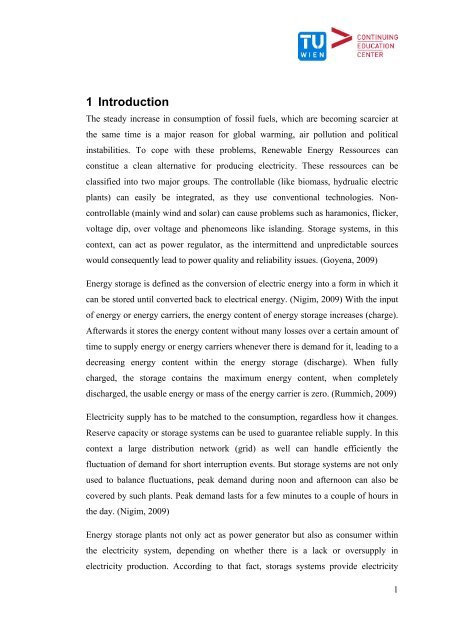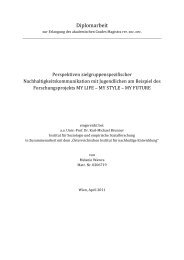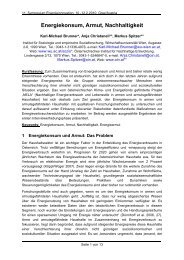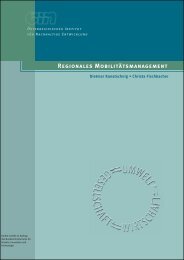The relevance of energy storages for an autarky of electricity supply ...
The relevance of energy storages for an autarky of electricity supply ...
The relevance of energy storages for an autarky of electricity supply ...
Create successful ePaper yourself
Turn your PDF publications into a flip-book with our unique Google optimized e-Paper software.
1 Introduction<br />
<strong>The</strong> steady increase in consumption <strong>of</strong> fossil fuels, which are becoming scarcier at<br />
the same time is a major reason <strong>for</strong> global warming, air pollution <strong>an</strong>d political<br />
instabilities. To cope with these problems, Renewable Energy Ressources c<strong>an</strong><br />
constitue a cle<strong>an</strong> alternative <strong>for</strong> producing <strong>electricity</strong>. <strong>The</strong>se ressources c<strong>an</strong> be<br />
classified into two major groups. <strong>The</strong> controllable (like biomass, hydrualic electric<br />
pl<strong>an</strong>ts) c<strong>an</strong> easily be integrated, as they use conventional technologies. Non-<br />
controllable (mainly wind <strong>an</strong>d solar) c<strong>an</strong> cause problems such as haramonics, flicker,<br />
voltage dip, over voltage <strong>an</strong>d phenomeons like isl<strong>an</strong>ding. Storage systems, in this<br />
context, c<strong>an</strong> act as power regulator, as the intermittend <strong>an</strong>d unpredictable sources<br />
would consequently lead to power quality <strong>an</strong>d reliability issues. (Goyena, 2009)<br />
Energy storage is defined as the conversion <strong>of</strong> electric <strong>energy</strong> into a <strong>for</strong>m in which it<br />
c<strong>an</strong> be stored until converted back to electrical <strong>energy</strong>. (Nigim, 2009) With the input<br />
<strong>of</strong> <strong>energy</strong> or <strong>energy</strong> carriers, the <strong>energy</strong> content <strong>of</strong> <strong>energy</strong> storage increases (charge).<br />
Afterwards it stores the <strong>energy</strong> content without m<strong>an</strong>y losses over a certain amount <strong>of</strong><br />
time to <strong>supply</strong> <strong>energy</strong> or <strong>energy</strong> carriers whenever there is dem<strong>an</strong>d <strong>for</strong> it, leading to a<br />
decreasing <strong>energy</strong> content within the <strong>energy</strong> storage (discharge). When fully<br />
charged, the storage contains the maximum <strong>energy</strong> content, when completely<br />
discharged, the usable <strong>energy</strong> or mass <strong>of</strong> the <strong>energy</strong> carrier is zero. (Rummich, 2009)<br />
Electricity <strong>supply</strong> has to be matched to the consumption, regardless how it ch<strong>an</strong>ges.<br />
Reserve capacity or storage systems c<strong>an</strong> be used to guar<strong>an</strong>tee reliable <strong>supply</strong>. In this<br />
context a large distribution network (grid) as well c<strong>an</strong> h<strong>an</strong>dle efficiently the<br />
fluctuation <strong>of</strong> dem<strong>an</strong>d <strong>for</strong> short interruption events. But storage systems are not only<br />
used to bal<strong>an</strong>ce fluctuations, peak dem<strong>an</strong>d during noon <strong>an</strong>d afternoon c<strong>an</strong> also be<br />
covered by such pl<strong>an</strong>ts. Peak dem<strong>an</strong>d lasts <strong>for</strong> a few minutes to a couple <strong>of</strong> hours in<br />
the day. (Nigim, 2009)<br />
Energy storage pl<strong>an</strong>ts not only act as power generator but also as consumer within<br />
the <strong>electricity</strong> system, depending on whether there is a lack or over<strong>supply</strong> in<br />
<strong>electricity</strong> production. According to that fact, storags systems provide <strong>electricity</strong><br />
1
















